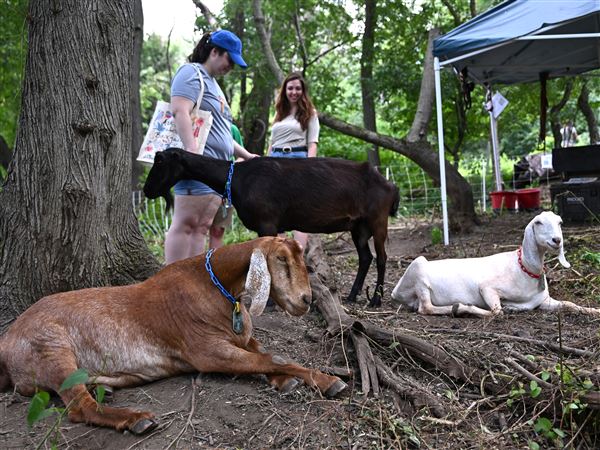When school lets out for the day, Franklin Avenue in Carnegie around Carnegie Elementary School is a beehive of activity.
On Friday, however, the activity involved real honeybees clinging to a stop sign at Franklin Avenue and Charles Street.
"There were lots of them," said Carol Covi, of nearby California Avenue. The swarm was at least two feet high, she said.
Ms. Covi was alerted to the hovering bees by her nephew when he came home from school shortly after 3 p.m.
She said the swarm started out on the sign and over the weekend moved gradually down the post.
To the relief of Ms. Covi and others, the swarm -- with the queen, hive and bees intact -- was removed Sunday by a beekeeper contacted by Bee Control Pittsburgh and placed with a beekeeper in the South Hills area.
The company had been informed about the swarm by Carnegie police, who had placed yellow caution tape around the area.
"It's a very common phenomenon this time of year," said Ian Hough, of Ross, owner of Bee Control Pittsburgh. "We've had them land on top of people's cars."
He explained that swarms occur when the population of a beehive gets too large. That can occur for different reasons.
Part of the hive, also known as a colony, led by a queen, takes off, with her fellow bees surrounding her to protect her. While the colony roosts temporarily on spots such as poles, parking meters and traffic signs, scout bees comb the neighborhood for a suitable place to relocate the hive.
The process generally takes three to four days. Often, the permanent home for a beehive ends up being in a tree hollow.
Swarms can contain 3,000 to 15,000 bees and weigh 1 to 2 pounds, Mr. Hough estimated. Individual bees may live only a few weeks or months, but colonies can continue for years.
Though some people are fearful of bee swarms, Mr. Hough said honeybee swarms in this section of the United States are of the European variety, meaning they are placid creatures.
They also have become a protected species.
Sunday's trip to Carnegie was not the first for Mr. Hough's company.
Police Chief Jeffrey Harbin recalled that last year, a swarm clustered on a parking meter on East Main Street. Mr. Hough also recalled visiting East Main Street to rescue swarms on other occasions, too.
Bee Control Pittsburgh, which serves a 35-mile radius in southwestern Pennsylvania, works with about 15 beekeepers in the area, but Mr. Hough said the region has many more beekeepers than that.
First Published: May 15, 2008, 4:00 a.m.














